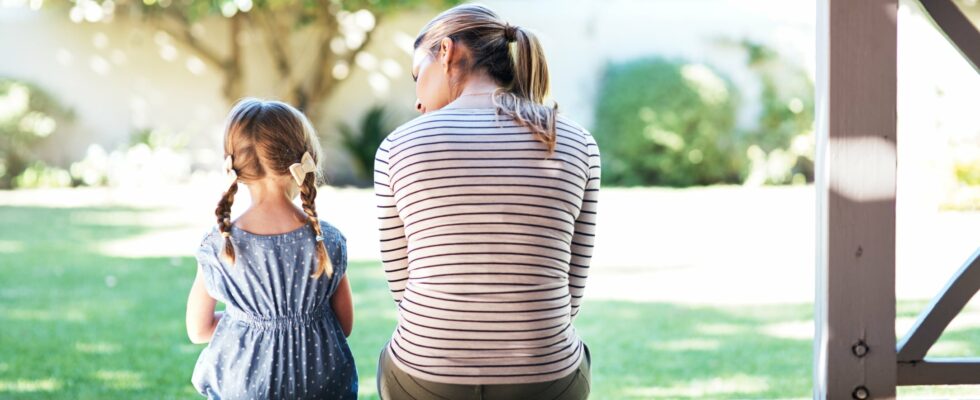“Watch out for screens, video games, social networks”. “You are too lax, you have to be more severe.” “No, don’t say no, don’t punish your children, be attentive and benevolent”. On the Internet, on television, in booksellers or social networks and even within families or groups of friends, educational injunctions, very often contradictory, swarm. An avalanche that some do not hesitate to make a derision.
In recent weeks, a new trend has emerged on social networks after a humorous video of the tiktofer “Jessica French Riviera”: the “Ghettossori” method. This joke aims to caricature the proponents of the Montessori method: supposedly easy mothers who benevolence all the whims of their children, always prepare organic dishes and do not forget to boast of it, while spreading the injunctions ‘Positive education. Behind mockery, the desire to guilty the imperfect mothers who do “as they can”. The theme videos quickly multiplied. And the quest for additional views and likes has led to certain slippages, such as comments or acts trivializing ordinary educational violence. This did not fail to provoke new anti-Ghettossori videos.
“I see this phenomenon as a parallel of the Caroline Goldman psychoanalyst [NDLR : dont le ‘time-out’ et son opposition à l’éducation positive lui ont valu une certaine célébrité]or a new return of stick in relation to what I call naive, benevolent and good intentions positive education, but which does not necessarily give very effective tools to manage the behavior of children, estimates Franck Ramus, researcher In cognitive sciences at CNRS and the École normale supérieure (Paris). Some parents are trying, find themselves overwhelmed, feel incompetent, and react by doing the opposite of what positive education advocates “.
Science -based advice exist
So what can parents really do? The latter are undoubtedly overwhelmed by advice, very often of self -proclaimed experts more quick to surf these new moral panics than to transmit much more nuanced scientific data. Fortunately, there are educational advice, rational and validated by scientific methods, carried by researchers, psychologists, child psychiatrists and neuroscientifices that have been working on these issues for years. And thanks to them, it becomes possible to unravel the hazardous opinions of measurable facts.
The book Educate without exhausting: the tools for a positive education that sets limits (The Everyday Parenting Toolkit, in English) by Alan E. Kazdin, eminent psychologist of Yale specializing in children’s behavior, is a good example. Because unlike many other parenting works based on opinions, this book is based on decades of rigorous scientific research. Or more than 154 experimental studies carried out since the 1950s. “Kazdin’s approach is distinguished from both traditional authoritarian education, whose ineffectiveness has been scientifically proven, but also” naive positive education “which refuses any constraint, explains Franck Ramus. Rather, it offers an empirical method, based on the positive strengthening of desired attitudes, with specific and concrete recommendations applicable to all children, whether or not they present behavioral disorders. This approach aims to reduce conflicts while maintaining a clear and benevolent framework. “Better still, these tips can also apply to teachers, who often confront the same problems as parents.
In an interview with L’Express, Pr. Kazdin had presented the essential points of his method. Initially designed for very violent and anti -social children, his team and then extended their approach to the daily challenges of the education of all children. Called ACC (history, behaviors, consequences), the method is based on several key principles including the simulation of problematic situations in the form of a game, precise and demonstrative congratulations according to good behavior, regular repetition of exercises to anchor positive attitudes and ‘Translating use of the Time-Out as the only acceptable form of punishment. But beware, no question here of the time-out advocated by Caroline Goldman, who seized this positive education tool by deviating it.
Because Kazdin firmly opposes traditional punishment, explaining that they do not create lasting habits and can have long -term negative effects. He also believes that empathy alone is not enough to modify behavior, or that psychoanalysis is not adapted to the education of children. His method also applies to adolescents, with some adaptations in order to respect their need for autonomy. “It is indeed important to promote parenting methods which have all the benevolence of positive education, but which have also demonstrated their effectiveness: strengthening positive behavior and extinction of unwanted behavior”, confirms Franck Ramus .
Science ultimately transmits to us a simple but essential lesson: we are beware of spectacular speeches as easy conclusions, and prefer to take a step back and measure. Because if science cannot respond to all problems, it sheds light on and helps us make better decisions.
.
